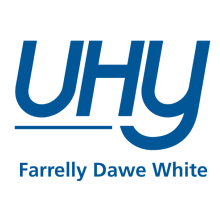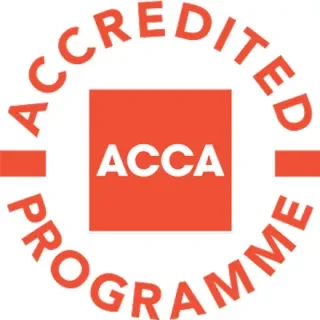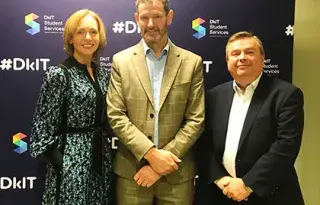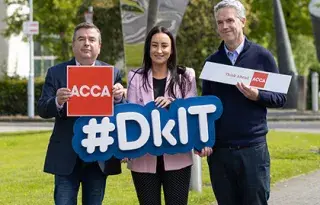BA (Hons) in Accounting & Finance

Search to find a different course
Course Overview
The course provides a comprehensive introduction to accounting, progressing to cover more complex theoretical and practical accounting studies. The course explores a variety of other topics, including business, law, taxation, auditing, professional management, economics, corporate finance, microeconomics and macroeconomics, marketing, human resources management, and communications.
For those students that choose the accounting career pathway, it is important to note that the course has exceptional exemptions from examinations of professional accounting bodies. The re-accreditation by the ACCA, a global body for professional accountants, comes with exemptions for up to nine papers - the maximum available for any undergraduate degree.
What makes this course different
Excellent Career Opportunities
100% of graduates in employment or further study after 6 months of graduating (95% in employment, 5% further study) - (DkIT/HEA Graduate Survey)
9 ACCA Professional Accounting Examination Exemptions
The nine exemptions available from the ACCA are the maximum available for undergraduate degrees in Ireland.
Work Ready Graduates
The development of the skills required for an increasingly dynamic career within Accounting and Finance.
Understanding the Industry
Accountancy and finance are two interconnected disciplines that form the backbone of modern business and economic systems. Accounting informs all areas of business, from strategy to outsourcing and operational planning to environmental policies. It involves processes such as bookkeeping, financial statement preparation, auditing, and tax planning. Finance focuses on the management of money, investments, and financial resources. It involves assessing risks, making financial decisions, raising capital, and analysing the performance of businesses.
Career Opportunities
Future Careers:
- Accountant
- Banking
- Financial Services
- Payroll Manager
- Management Accountant
- Accounts Assistant
- Chartered Accountant
In these areas:
- Accountancy Firms
- SMEs
- Fintech
- The Revenue Commissioners
Graduates work at

Course Delivery and Modules
To read all the module descriptions, please visit https://courses.dkit.ie/index.cfm/page/course/courseId/1093
- Marketing
- Microeconomics
- Management
- Quantitative Techniques
- Foundation Accounting | Macroeconomics
- Human Resource Management
- Operations Management
Electives:
- Introduction to Business Computing
- English
- Communication Skills for the Workplace
- Technology & Information Management
- Organisation Behaviour
- Business Law
- Managerial Economics
- Cost and Management Accounting
- Financial Accounting
- Research & Writing Skills
- Company Law
- Public Finance
- Business Planning
- Taxation
- Management Accounting
- Strategic Financial Management
- Corporate Reporting and Accountability
- Business Strategy
- Performance Management
- Auditing
- Financial Services
Professional Accreditations
Graduates gain exemptions through accreditations with the Association of Chartered and Certified Accountants (ACCA), Chartered Accountants Ireland (CAI), and the Association of International Certified Professional Accountants (AICPA -CIMA).
The nine exemptions available from the ACCA are the maximum available for undergraduate degrees in Ireland.
Exemptions
- Association of Chartered Certified Accountants (ACCA):
All 9* of the exams at the Fundamentals Level;
F1 Accountant in Business, F2 Management Accounting, F3 Financial Accounting, F4 Corporate and Business Law, F5 Performance Management, F6 Taxation, F7 Financial Reporting, F8* Audit and Assurance, F9 Financial Management.
(* To gain the Audit & Assurance exemption, graduates must take Auditing in the award year).
- Institute of Chartered Accountants in Ireland (ICAI):
All 5 subjects in CA Proficiency 1, namely:
Paper 1 Law for Accountants, Paper 2 Finance, Paper 3 Management Accounting, Paper 4 Financial Accounting and Paper 5 Taxation. - Association of International Certified Professional Accountants (AICPA -CIMA).
Exempt from 10 exams and 1 case study exam for the first 3 of the 4 levels of this qualification.
All 4 subjects at the Certificate in Business Accounting Level- Fundamentals of Business Economics
BA2 Fundamentals of Management Accounting
BA3 Fundamentals of Financial Accounting
BA4 Fundamentals of Ethics, Corporate Governance and Business Law - All 3 subjects and the case study at the Operational Level ;
E1 Managing Finance in a Digital World
F1 Financial Reporting
P1 Management Accounting and Operational Case Study Exam - 3 exams at the Management Level:
E2 Managing Performance
F2 Advanced Financial Reporting
P2 Advanced Management Accounting
- Fundamentals of Business Economics
All Exemptions are granted by the relevant professional accounting body and are subject to change.

Education Progression
Graduates can progress with professional accounting examinations after completing this course.
Graduates can also progress to the MBS in Entrepreneurship and Marketing.
MBS in Entrepreneurship and Marketing
Fees and Funding
Please find information on fees and funding here: www.dkit.ie/fees
Entry requirements
Standard entry requirements apply. There are no special entry requirements for this course.
- Standard Requirements for Leaving Certificate Applicants
- Standard Requirements for UK/NI Applicants
- Standard Requirements for QQI-Further Education Applicants
Recent CAO points
How to apply
Apply on CAO
All standard entry first-year applicants must apply for entry through the CAO. See Important application dates for CAO and information for specific applicant types below:
Advanced Entry & Transfer Applications
Advanced Entry is for applicants who have previous educational achievements and/or work experience and want to be considered for direct entry into year 2, 3, or 4 of a course. This includes students looking to transfer to DkIT from another Higher Education provider.
International Application (non-EU)
International Applicants (not from or living in the EU) can apply through an agent or directly to DkIT to study this course.
Ask us a Question
If you have a question about the BA (Hons) in Accounting & Finance please ask it below and we will get back to you.
Pat O Neill
Disclaimer: All module titles are subject to change and for indicative purposes only. All courses are delivered subject to demand and timetables are subject to change. Elective Module options will only run subject to student numbers. The relevant Department will determine the viability of each elective module option proceeding depending on the number of students who choose that option. Students will be offered alternative elective modules on their programme should their preferred elective option not be proceeding. Award Options for Common Entry Programmes: The relevant Department will determine the viability of each award option proceeding depending on the number of students who choose either option. If the numbers for one of the Award options exceed available places, students for this option will be selected based on Academic Merit (highest grades).






